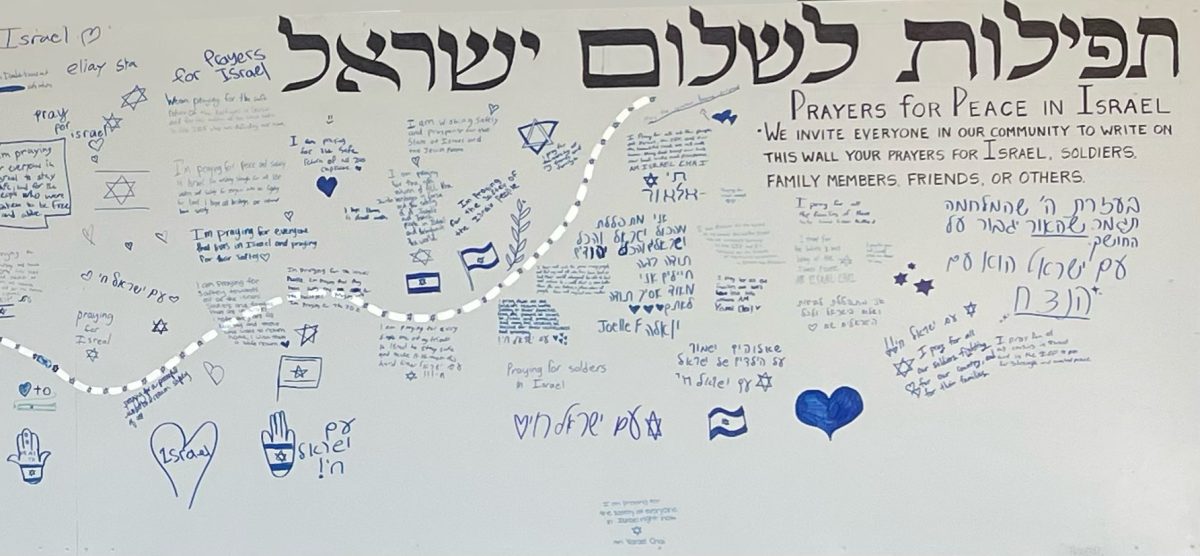On October 7, Rabbi Candice Levy went through her Saturday morning thinking it was a normal day. As it was Shabbat, she was not using electronics, and as usual, she went to synagogue.
The first moment she realized that something was not right was when, during the service, her six-year old son told her, “‘Something’s wrong. The songs are not the same,’” Rabbi Levy explained. ”Because it was Sukkot there was this special prayer of Hallel, but it was the saddest Hallel I’ve ever heard.” The Sukkot service, which would normally be one of celebration, had a dark cloud hanging over it: the unprecedented bombing and gruesome massacre of Israeli civilians, which Rabbi Levy learned of after services.
Early that Shabbat morning, the radical Palestinian political party and terrorist organization Hamas had staged an all-out attack on Israel. The United Nations estimated that over 1,400 Israelis have been killed from these attacks, and over 3,000 were wounded, with 246 hostages taken into Gaza. Although Jews and Arabs have had conflict since the before founding of Israel in 1948, and Hamas specifically has been “carrying out terrorist attacks on Israeli civilians since the 90s,” according to Mr. Meyerson, Milken’s Israel Education Coordinator, the attacks were “never on this scale, and not with this level of sophistication.”
The events of that weekend shifted the sense of security for Jews around the world, and that shift has been felt acutely at Milken, where a significant number of students and faculty are Israeli or have relatives living in Israel. Coming to school after the events simply felt different: it was not unusual to see people break down in tears. In the days that followed, a sense of urgency and an obligation to take action led to several students creating groups to support Israel.
As a community, Milken will never be the same.
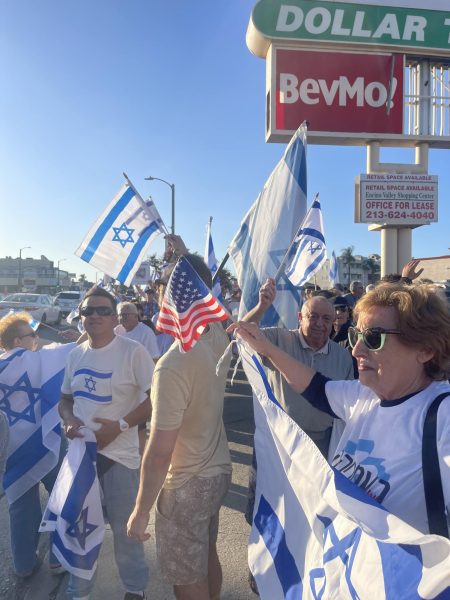
On the Monday following the attacks, over 800 students and teachers crowded into Milken’s gym for a town meeting. It was an inspiring moment of community and unity. The circumstances that had occurred the previous weekend had been emotionally difficult, but, 11/12 division head Beau Lindsay felt that “there was a sense of solidarity and comfort to be together in that space.” Rabbis Gordon Bernat-Kunin, David Saiger, Shawn Fields-Meyer, and Israeli teachers Iris Harel, Pnina Benperlas and Anat Ben-Haim spoke at the town meeting. As they recited Hebrew and English prayers at the assembly, such as the prayers for peace, for the State of Israel, and the Israeli Defense Force (IDF), there was a renewed sense of unity in the Milken Community.
When Hebrew Teacher & Division 6-8 House Leader Iris Harel first started hearing news of the attacks taking place in Israel on October 7, she “didn’t think it was such a big deal” and initially believed that the situation only involved Hamas missiles being fired into southern Israel, an unfortunately common event. However, as the situation continued to unfold and she learned of Hamas terrorists entering Israel, she was in shock and “still doesn’t feel like it really happened.”
Morah Iris gave a blessing during the morning assembly for the many soldiers serving in the IDF. She began to cry, heartbroken by the inhumane attack on her country. Although her niece Kylee Harel ‘24 was ready to finish the blessing for her, Iris felt that she must finish the blessing out of “respect” for those in the IDF. Morah Iris’ son and nephew are both currently serving in the IDF. “Every day he is alive is a good day” said Iris. Both her son and her nephew know fellow IDF soldiers who have been killed in the conflict.
During these difficult times though, she described herself being “embraced by the community” as students, teachers, and faculty members have been frequently asking her about her family living in Israel.
However, she believes that Milken Middle School students should be more heavily educated on the conflicts and overall history in Israel. Iris also added that Milken already has a large amount of pride in our Jewish identity but she “doesn’t know if we have enough Israeli pride.”
High school Hebrew Teacher Pnina Benperlas agrees that there is “more room at Milken” for Israel education in order to prepare students for college and the “real world” where all Jewish people “face tough questions.”
Morah Benperlas has a lot of personal experience with the impacts on individuals that terrorist attacks can have. While growing up, in 1973, Palestinian terrorists from Lebanon entered the northern city she lived in, Kiryat Shemona, and she “hid underneath the bed for five hours.” Her family living in Israel was greatly impacted by this and she now has a deeper understanding of the trauma and shock that being attacked can cause.
For this reason, she has made it her mission to help students struggling with the events in Israel. On Monday, October 9, “she found herself going from student to student in the hallway” trying to comfort those who needed it. Morah Benperlas created a safe space in her classroom in which students can express the way they feel and speak of anyone they know put in danger by Hamas attacks.
She has also been doing her best to comfort her fellow teachers in the Hebrew Department whose families have been affected by the attacks. “It’s in our DNA to help each other in times of crisis,” she said.
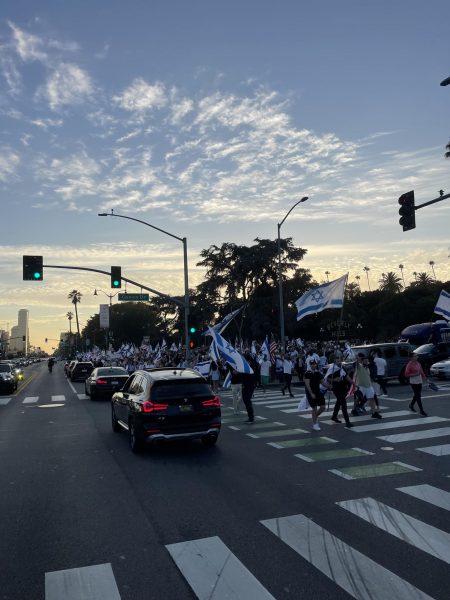
As students have been grappling with their emotions, Mr. Lindsay noted that even that Sunday, he started receiving emails asking, “What can we do? What actions can we take? How can our community respond?” Patches of blue and white have been spread around campus; students have been wearing Israeli flags on their backs and wearing IDF shirts, despite the merch regulation. Some students have even started creating and selling ‘Am Yisrael Chai’ merch, the proceeds for which will be donated to specific organizations supporting Israel.
Student groups have formed across campus in support of Israel. When Eli Pournazarian ‘24 heard about Hamas’ actions in Israel, he “didn’t really know how to respond at first.” His immediate actions were only focused on needing to contact his family in Israel. After the initial weekend, however, Pournazarian started taking action both at Milken and beyond. He attended rallies on Monday and Tuesday, as well as a vigil hosted by the Stephen S Wise Temple. At Milken, he is the leader of the StandWithUs club (a branch of StandWithUs, a nonprofit dedicated to “Supporting Israel and fighting anti-semetism”), and of an education task force that originated in a meeting with Pournazarian, some other students, and Dr. Shulkind.
Pournazarian is just one of the many students at Milken who have taken on the responsibility of assisting Israel. As Mr. Meyerson put it, “The one thing that’s been really clear to me is just how deeply connected the Milken community is with Israel, between my colleagues and in the faculty, staff, and the students, and there’s a lot of initiative by students to want to do something.”
Students have been working in committees to support Israel and provide resources, deciding how to fundraise and choosing where money and supplies should be donated to. Even efforts such as writing letters to IDF soldiers and displaced families in Israel were organized in the past week.
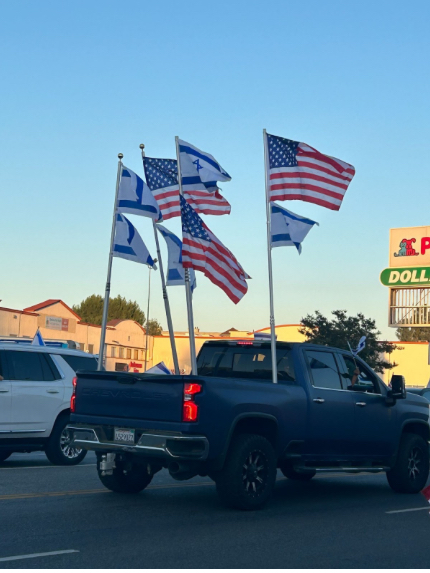
Teachers and students have also been prioritizing a need for education. Mr. Lindsay understands that students need to know “baseline knowledge so that we can understand media and where we should and shouldn’t be looking for sources.” He recognizes the importance of understanding the media at a time like this when so many horrifying pictures and videos are being posted during this time. The distribution of information to the community begins in Milkens’ history classes; all 6th to 11th grade history classes have been receiving a base knowledge of the history of the relationship between Gaza and Israel.
Teens all over Los Angeles have started to create opportunities to advocate, educate, and unify Israel supporters during these tough times. On Sunday the 14th, Lexi Gold, a senior at De Toledo high school held a teen-led vigil where families gathered to pray and hear about the tribulations of the war from multiple perspectives including a Holocaust survivor, a UCLA professor, along with Israeli and Jewish teens. Young leaders creating these initiatives continue to represent the resilience of Israel.
On the Tuesday after the initial attack on Israel, approximately 75 students and teachers attended a pro-Israel rally at the federal building. “I thought the desire was so beautiful,” said Mr. Lindsay. As the students left school early with Israeli flags in hand, “they were making a point.” Hundreds of Jews and Israelis all around Los Angeles have been attending protests in the past week, which has been a great testament to the strength and solidarity of the LA Jewish community.
Noa Foruzanfar ‘25 attended the rally in Beverly Hills on October 10 and said, “Honestly, like that whole entire day, I was super down because of what was going on… but going to the rally was very empowering, And I felt the unity and I felt us all having so much faith and hope in the future of Israel.”
Even in the midst of rallies and vigils, many people are unsure whether they feel safe presenting themselves as Jewish. 2022 Milken graduate and current Chapman student Gabi Bekhrad said “I think there was a moment where I hesitated wearing my Star of David necklace… But what I realized is that this is what people want…So I’m okay with feeling a little bit uncomfortable wearing my necklace instead of tucking it underneath my shirt.”
A Milken senior says that at the moment she is struggling with wanting to be proud of her Judiasim and feeling scared to show Jewish pride. She is most scared for her cousins who visibly display their Judaism and wants to tell them to be careful yet she does not want “Hamas to have this level of control” in their daily life.
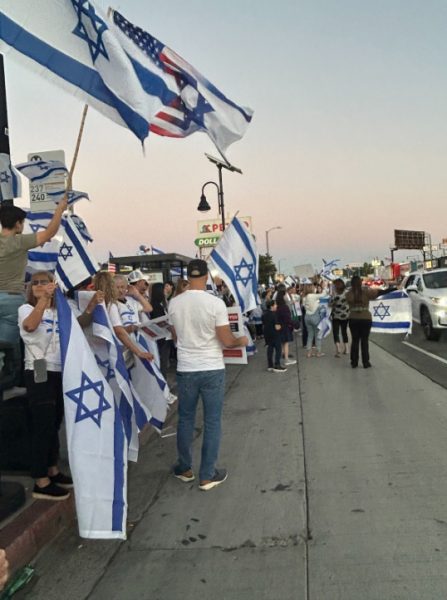
While the Milken community has come together in response to these horrific acts, recent graduates are finding themselves part of the minority within their universities. Bekhrad, attending Chapman University, said that in her sorority, she and a group of other Jewish people had to be the one to bring up the topic and while people listened, it felt disappointing that she had to be the one to address these attacks. “If you’re at Milken, it’s…solely a Jewish community. So everyone’s kind of going through everything at the same time and together.” she says. “For everyone else, it’s just a regular week. But for the small minority of students that have been affected by it, it’s not just a regular week.” At first Chapman’s administration was silent, until many students and parents reached out resulting in a neutral statement and then after a few days the president put out a statement condemning the indefensible atrocities that occurred, Gabi and a group of people put Israeli flags in the grass only for someone to put a larger Palestinian flag on the tree above and for someone else to remove all the Israeli flags.
At San Diego State University, on Friday, October 13 the Students for Justice in Palestine held a vigil in support of Palestine. Noa DeBasc ‘23 says that this event was referred to as a vigil in support of Palestinian “martyrs”. She felt angry and unsupported by her school when even after Jewish students went to SDSU administration two days before the vigil asking to either put out a statement or to dismantle the demonstration, the school “simply responded that they couldn’t do anything about it because it’s a public institution. And this was after the school had waited a while to send an email about the war in the first place.” Debasc is referring to the way SDSU only sent out a message on the war on Monday night when it started on Saturday. Additionally, she says, “It was vague in terms of who was the victim of the war. And obviously, any innocent person on either side has been a victim. It wasn’t clear …that the school sides with Israel, and condones the losses, acts of terror. Hamas being a terrorist organization, like it wasn’t clear enough about that, which I know is semantics, but I think it’s still important to clarify.”
A number of Milken alumni call Israel home. Jonathan Zur ‘13, an alumnus of Milken, was in Israel when the war began. “Everyone was just in a state of shock.” he said. In the next couple of days, he felt a transition from shock and anguish to a focus on action. Jonathan works at a military UAV drone company in Hadera, and has been working every day since the war began for over 11 hours each day. Dr. Schwartz and Mr. Mankuta have spoken with Jonathan’s parents, and he felt that “it was very touching, I really appreciated that they reached out.” He recommends that people reach out and stay in contact with family and friends as much as possible.
Milken has a multitude of Persian-Jewish students, and the anti-Israel stance that Iran is currently taking has left students feeling conflicted. The Iranian government’s goal is to spread Sharia law to other countries. Iran has now started supporting radical groups such as Hamas and Hezbollah in Lebanon. The goal of these two groups is to destroy the state of Israel. Just recently, speculation has been circulating that Iran has begun producing lethal weapons, and have sold these weapons to Hamas and Hezbollah which they use to eventually kill Israeli civilians.
Adina Yaghoubian’s ‘25 parents are both from Iran, but she’s “proud to be Jewish and a Persian, but the fact that Iran is not supporting Israel, makes me feel really ashamed to be Persian. Iran has provided the financial source of all these weapons going to Israel, and that just doesn’t sit right with me. I am going to support Israel as much as I can, even though I live so far away.”
Nika Khaloyan’s ‘25, parents are both from Iran, and she said “As a Persian, I feel like I understand the conflict that some people may have with Iranian people, but I know that the civilians in Iran are separate from the government. I am not against the civilians in Iran, I am against the Iranian government, I am against Hamas, and I fully stand with Israel.”
As the violence in Israel continues and 241 hostages are still held in Gaza, the Milken community is devastated and together is staying strong. One way people can help is through donations. Below are some verified organizations which help in Israel.
- Friends of the IDF is the only organization officially tasked with accepting donation on behalf of the Israeli Defense Force
- Magen David Adom, Israel’s official representative to the International Red Cross, precludes it from accepting governmental support for its general operations. Because of this arrangement, MDA relies on support from donors, to keep its dispatch systems, training, and equipment the best in the world. MDA handles disaster relief, ambulance, and blood services.
- The Jewish Federation of Greater Los Angeles, The Jewish Federation of Greater Los Angeles convenes and leads the community and leverages its resources to assure the continuity of the Jewish people, support a secure State of Israel, care for Jews in need here and abroad, and mobilize on issues of concern to the local community, all with our local, national, and international partners.
- The Jewish National Fund, Helps ensure a strong, safe, secure prosperous future for Israel.
The smallest donation can make a difference.
Additional writing and reporting by Noa Berrin, Isabella Green, Micah Green, Noa Karidi, Andrew Pakravan, and Tomer Zur



